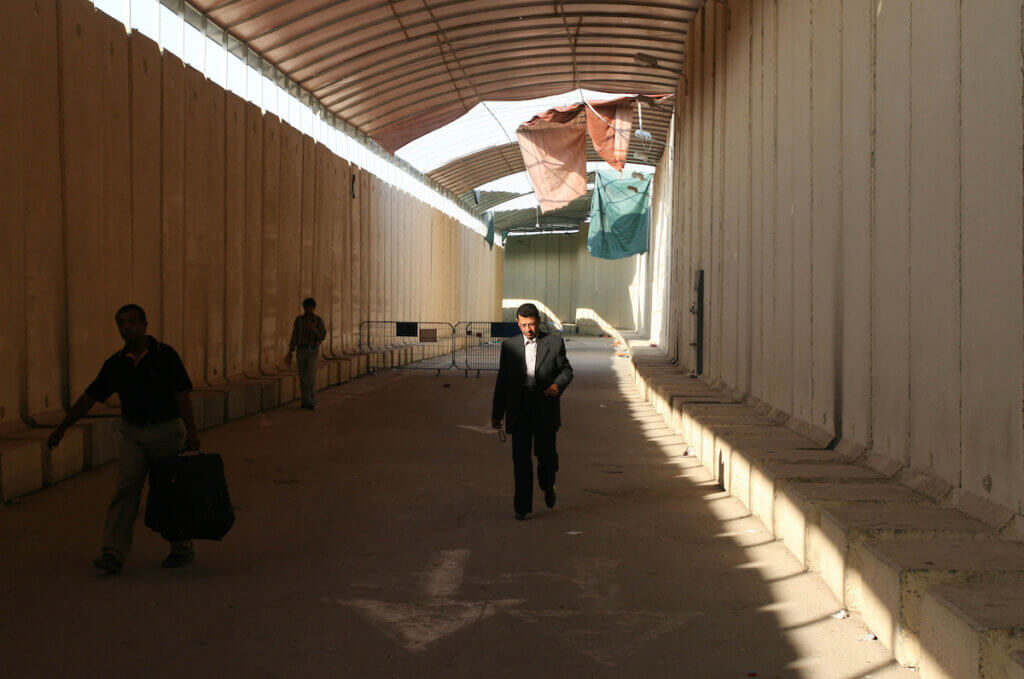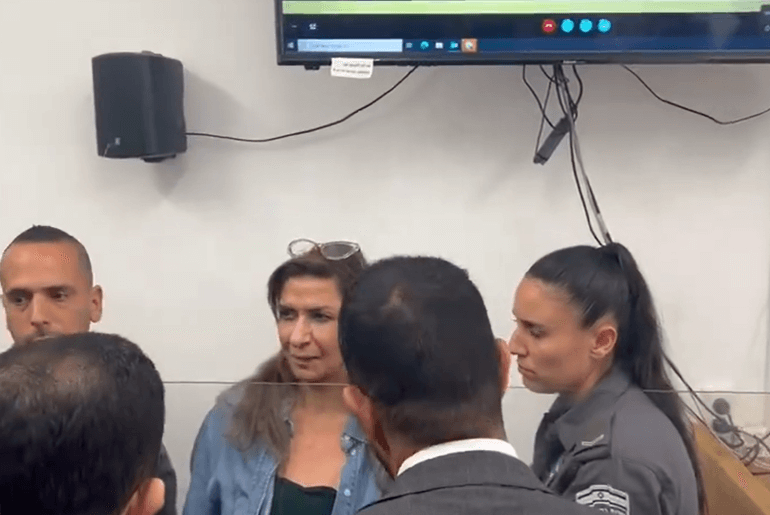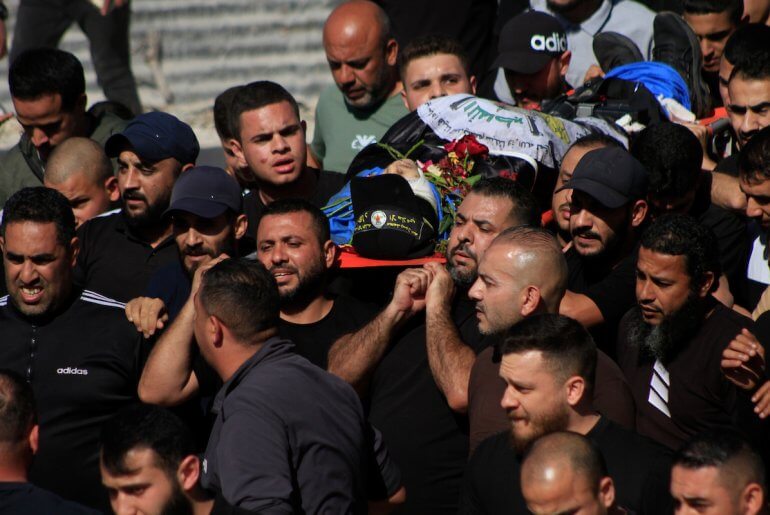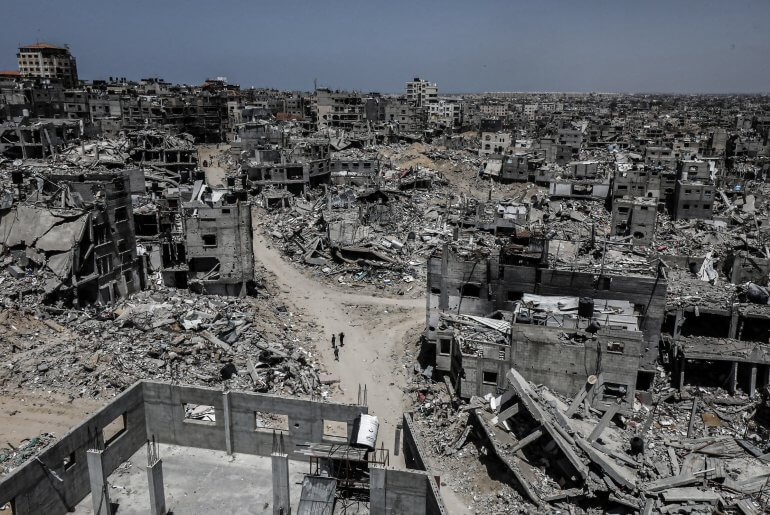It was my first trip out of Gaza, and my destination was the city of Nablus in the West Bank to pursue my university studies. At the time the Oslo Accords were still somewhat in effect. That allowed Palestinians from Gaza to travel to the West Bank – through Israel – provided they were issued a permit by the Israeli authorities.
Since I was only 18, a hot-headed teenager with a mood for security breaches, so the Israeli authorities assumed, I was required to have an adult escort me across the checkpoint exiting Gaza. Someone old enough and, preferably, too frail to pose any security threats.
My grandfather immediately volunteered to be my trip chaperone. He would travel with me to Nablus, find me somewhere to live, and then head back to Gaza on his own. Little did I know then, the trip was going to be a life-changing experience.
As we cut through Israel I was mesmerized by the nice landscape. The scenery may not have been breathtaking, but from the perspective of someone who lived most of his life in a refugee camp, everything seemed novel and extraordinary. Beyond the beauty, however, there was the realization that our loss was indeed enormous. All this used to be ours? All this was stolen from us? I couldn’t help but wonder in disbelief.
Nearly 30 kilometers away from Gaza, my grandfather broke his silence and asked the driver to slow down and started to look around attentively. At that point, I realized we were somewhere near his old village, Al-Sawafir. Excited, I began to summon all of my grandparents’ magical anecdotes about that “paradise village.”
Paradise lost
I imagined my grandparents’ village as a utopian society with leafy footpaths, lines of olive trees evanescing into the horizon, and fields embellished with countless poppies. I visualized it — as Edward Said once depicted it — “some real but partly mythologized spot of land,” one that stood in stark contrast to life in the refugee camp where we grew up. Through the anecdotes of that paradise lost, at an early age, I learned about loss and internalized an immense feeling of nostalgia for a land that I never physically set foot in.

Now in the taxi parked on the side of the road in the middle of nowhere, surrounded by open fields, my grandfather disembarked and walked purposefully into a nearby field.
My grandparents’ village was called Al-Sawafir, based on the ancient Roman name Shaffir, and it was located only a few kilometers from Ashdod, a Palestinian city built upon the ancient Canaanite urban settlement with the same name. Al-Sawafir was divided into three sections, eastern, western and northern, perpendicularly separated by a road originally built by the Ottomans. All of the sections were ethnically cleansed early in 1948 during Operation Barak, a Haganah-led onslaught and part of Plan Dalet, which represented the Zionist master plan for the conquest of Palestine.
My family belonged to the western part, Al-Sawafir Al-Gharbiyya, and that’s exactly where my grandfather was headed. His confident steps made me think he was there only recently and not – at the time – 50 years prior.
All I can see were old ruins, random lines of cacti, sporadic citrus and olive trees, a large sycamore tree, and what looked like a power transformer with a Hebrew placard stuck on it. The village was everything but the utopia in my grandparents’ anecdotes.
Dragging me deeper into the field and looking increasingly confused, my grandfather asked if I could help him find his father’s grave and the ruins of his old house. An odd request, I thought. How can I find my great-grandfather’s grave in a place I never visited before, much less make out a grave-like structure amid the piles of rocks and ruins which can be seen hesitantly peaking through the long grass and bushes?
As time passed fruitlessly, frustrated and seemingly tired, my grandfather collapsed on a small rock and began to weep. Uncomfortable and unsure what to do, I convinced him to halt the search and call it a day.
Strangely, feeling like intruders, we rushed back to the taxi before the Israeli police showed up and continued our journey. To this day, I continue to think about the irony of acting – and feeling – guilty on a land that was stolen from us.
My grandfather’s tears that day were transformative. In Palestine, men are taught not to cry: it is unmasculine, a sign of weakness, and above all, one is always reminded, “fighters do not cry.” You can’t help it when these are defining standards of Palestinian masculinity, ones specifically designed to withstand the enormous odds in our daily existence. But when men do cry, my grandfather would tell us, it is because “the weight on one’s shoulders is heavier than mountains.”
This is certainly true for him. As the mukhtar, the clan leader of all the Gaza families originating from Al-Sawafir Al-Gharbiya, he always had to remain composed and wear solemnity as a badge of wisdom and dignity. To cry is to basically violate everything he was. It truly was a mountain he could no longer carry. It would take me a few years to understand his metaphor. Only recently, however, I began to identify with his type of pain. The feeling of loss, it seems, grows with you as you get older.
I often wondered how harrowing it must have been for him to wait and wait only to discover that there is no longer a door to the old, rusty key that he had anxiously guarded for decades. The whole exodus was supposed to last for a month at best, so everyone thought. My grandmother told me that this assumption was so strong to the extent that her brother bought several pieces of land in villages on their way to Gaza. He was confident that the “Arab armies were going to push the Zionist gangs out
“ and he’d return, only a known landowner this time. The month turned into months, and the months grew into years, then decades, and the wait continues today 73 years later.
Up until his death, my grandfather continued to speak of that paradise village, of his Palestine. As if what he saw that day was only a fleeting thought. His memories were perhaps more real than the physical ruins of what used to be his village. To him, time stood still, and the memory of the village continued to define all other memories thereafter.

Memory nomads
My grandfather was not unique in his sentiment. He was, like every other Palestinian, a nomad traveling across a landscape of memory. Like all others, his memory was premised on three main motifs: the praise of a long-gone paradise lost; the lamentation of a present defined by military occupation; and, the hopeful visualization of a return to Palestine, where justice will finally be served.
The longer we clung to that memory the closer we felt we become to the day of return. As if memory was a purpose in itself, as Ghassan Kanafani once said in 1981: “even though we know tomorrow will be no better, we remain here on the shore eagerly awaiting the boat that will not come.”
Same as my grandfather who chose to ignore the seemingly new power transformer and the Hebrew signs in and around his village, one must disregard that we have been mentally and physically erased and replaced. As though to force ourselves to feel that our current state— and theirs — is only temporary.
This is why the question “where are you from?” bears a different meaning to Palestinians. As descendants of refugees living in Gaza, you’d answer by saying you’re from Majdal (Ashkelon), Ashdod, Jaffa, the Negev, and in my case, Al-Sawafir. It’s customary and perfectly normal to ignore the fact that you and possibly your parents were born and raised in Gaza. As if to say, Gaza is only a stop-by on the journey back to Palestine.
This gives us the comforting feeling that history is yet to come to a halt and can still be reversed. It matters not if such worldview is only a coping mechanism or representing a tangible blueprint for return. After all, Palestine is a state of consciousness, Edward Said reminds us, representing “a vast collective feeling of injustice continues to hang over our lives with undiminished weight.”
Erasure
But, that state of consciousness is also steered by a strong fear of oblivion, of being completely erased from history. As Palestinians look toward Israel, all they can see is that the physical spaces they once occupied have been (or are being) physically transformed to mentally erase them.
Just think for a moment about the tragic irony that the Israeli museum commemorating the Shoah victims, Yad Vashem, sits on top of a hill overlooking the village of Deir Yassin, the site of the known Deir Yassin massacre and a prominent symbol of the Palestinian catastrophe. There are no markers, signs, or memorials, and no mention from tour guides in the museum regarding what their visitors see from where they stand.
This is not a case of absence of remembering or ignorance, but a certain kind(s) of active forgetting that is selective and misleading. As Marcelo Svirsky in his book “After Israel: Towards Cultural Transformation” says, it’s one that makes the Jewish memory a means to conceal the hierarchies and constellations of power and deny perpetration, as well as to justify and protect the prevailing social order.
What’s disturbing about such forgetting is its banality. It normalizes and routinizes what otherwise be considered one of the most heinous crimes in modern history. In “The Ethnic Cleansing of Palestine,” Ilan Pappé calls the phenomenon memoricide, an erasure of one people from history in order to write that of another people’s over it.
Fearing the counter-narrative
Despite all the show of power and intransigence, Israel remains a torn entity constantly faced by its original sin. Only controlling the narrative through memoricide would allow the country to move past its guilt.
Intrinsic to the Zionist historical narrative is the idea that history could be controlled, molded, and changed by the formation of an active, task-oriented Israeli reality. But the validity and sustainability of such reality have only been achievable through the removal of other realities, the Palestinian reality.
This is exactly why, that, since its inception, the Israeli state has been systematically removing, replacing, or concealing the traces of Palestinian past from the Israeli public sphere: archaeological sites; Nakba-related archival material, school textbooks, as well as by creating legal impediments to make the return of Palestinian refugees virtually impossible.
It boils down to the simple fact that recognizing the Nakba shifts the responsibility for the Palestinian plight to Israel. This will profoundly challenge the country’s foundational narrative. This narrative concerns issues regarding the Jewish people’s historical persecution and the return from exile to sovereignty; the rightful rule over the land; and the belief that the Palestinian exodus was voluntary. These issues are essential to the maintenance of the societal beliefs in the justness and morality of the Jewish cause, especially upheld by the notion that Israel’s inception is a historical right, a redemption, for the persecuted Jews.
As far as Palestinian consciousness is concerned, none of Israel’s concerns matter. Memoricide doesn’t change the fact that the Nakba is not a past trauma; rather, a continuous reality. Today’s military occupation: the oppression, the checkpoints, the arrests, the killings, the humiliation, the imprisonment, and the lack of autonomy are all but manifestations of the Nakba.
My grandfather died in 2014, and the fact that I couldn’t travel to the besieged Gaza Strip to say my final goodbyes was, and continues to be, another one of those manifestations.




The world is waking up to the horrors perpetrated against the indigenous Palestinians by Zionists of foreign origin:
“European Powers Tell Israel to Halt Settlement Expansion in the West Bank”
‘The joint statement comes as tensions mount in East Jerusalem ahead of a hearing that could see Palestinian families evicted from Sheikh Jarrah” Reuters. Haaretz, May. 7/21
EXCERPT:
“France, Germany, Italy, Spain and Britain urged Israel on Thursday to halt settlement-building in the West Bank.
“The joint statement came as tensions mounted in East Jerusalem ahead of a hearing that could see Palestinian families evicted from Sheikh Jarrah, a neighbourhood where Jewish settlers backed by an Israeli court have taken over some homes.
“‘We urge the government of Israel to reverse its decision to advance the construction of 540 settlement units in the Har Homa E area of the occupied West Bank, and to cease its policy of settlement expansion across the Occupied Palestinian Territories,’ the European nations said.
“‘If implemented, the decision to advance settlements in Har Homa, between East Jerusalem and Bethlehem, will cause further damage to the prospects for a viable Palestinian State.'”